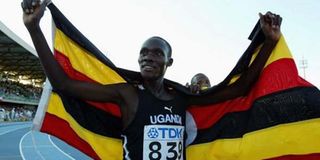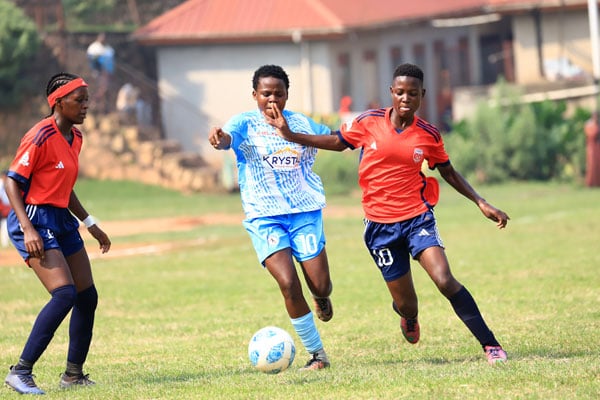When Kiprop landed first senior gold medal at Melbourne Games

Boniface Kiprop. FILE PHOTO
What you need to know:
Early Promise. Kiprop boasts of arguably the best-ever junior career by a Ugandan comprising four junior medals including the 10000m gold at the World Junior Championships in Grosseto, Italy in 2004. His senior career was short.
The best list to ever don Uganda’s athletics bibs always presents names like the late sprinter John Akii-Bua, marathoner Stephen Kiprotich, today’s global icon Joshua Cheptegei, Moses Kipsiro and Dorcus Inzikuru.
Often, Boniface Kiprop’s name is kept off the list. He is a forgotten man.
The forgotten man
And perhaps, understandably so, because the ordinary Ugandan or athletics fanatic has witnessed a lot of success since Kiprop’s career faded earlier than expected almost a decade ago. From the time Kiprop’s spikes turned heads, Kipsiro has bagged three Commonwealth gold medals, Kiprotich won Olympic marathon gold at the 2012 London Games while Cheptegei has already smacked four world records and space in his medal cabinet continues to fill up.
Kiprop’s career may have diminished by his mid-20s after he chose to focus on business back home in Bukwo but, he changed the face of Uganda’s athletics and history doesn’t forget.
Uganda’s 10th Commonwealth gold
He has arguably the best-ever junior career by a Ugandan comprising four junior medals including the 10000m gold at the World Junior Championships in Grosseto, Italy in 2004.
And two months before he turned 20 in 2005, he posted 26:36.77 behind Kenenisa Bekele’s 10000 world record of 26:17.53 at the Brussels Meeting in Belgium. And his trajectory peaked before he clocked 21 when he grabbed Uganda’s first long-distance championship title at the 2006 Commonwealth Games in Australia.
Aged 20 and five months, Kiprop too got his first major championship title following two earlier podium misses by beating a 10-man field over the 10000m final at the Melbourne Cricket Ground on Saturday March 25, 2006.
This was Uganda’s 10th gold medal in the history of the Commonwealth Games and the second for athletics, just three days after Inzikuru’s 3000m steeplechase triumph. Donning an orange bib then, Kiprop won the race in a time of 27 minutes and 50.99 seconds in front of an electric atmosphere.
Moment of ecstasy
“Tonight I wanted to win the race and I definitely knew it was there to be won,” Kiprop would say after the race. By the time Kiprop had his pupils dilated and arms spread wide to spark off his celebrations, his foe Kenyan Geoffrey Kipngeno was just crossing the finish-line for silver in 27:51.16.
The delight came for Kiprop after two big successive misses. He had settled for fourth over the 10000m race at the 2004 Olympic Games in Athens, Greece and the 2005 Helsinki World Championships in Finland.
“Kiprop’s biggest undoing was his final kick as witnessed at the 2004 Olympics and 2005 Worlds,” says Uganda athletics expert Sande Bashaija. By then, Bashaija was still an active athlete and he was yet to join the Daily Monitor sports desk where he would years later become sub-editor.
An East African affair
“He was always in contention but ran out of steam in the final 400m,” says Bashaija who watched that 10000m final in Melbourne on television while still at university.
And the East Africa Community completed the podium with Tanzanian Fabian Naasi taking bronze in 27:51.99 whereas another Kenyan Paul Langat settled for fourth. Also, Kiprop’s compatriot Wilson Busienei finished fifth in 28:37.38. And not many will recall these moments.
Cable television was then considered a luxury not a need. Facebook was not as popular a social media channel then as it is today.
Actually Twitter was only four days old and there was no WhatsApp, Instagram or Snapchat to amplify the delight as it has been done today for a medal won by Kiprotich or Cheptegei.
Back on track, the first five had gone toe-to-toe to break clear of the pack after the 10th lap but Kipngeno, Naasi and Langat were indecisive before Kiprop stole it, steering clear in the final lap. “He broke off with a pack of five runners after 10 laps and patiently waited for the right moment to strike,” Bashaija recalls.
“He broke away at the bell but was fiercely chased by Kipngeno. However, Kipngeno ran out of legs with about 200m to run and we were sure Kiprop had secured his gold. The pace wasn’t so fast from the start and I think this played into Kiprop’s favour.”
End of Kenya’s dominance
Uganda’s previous best finisher in the men’s 10000m final at the Games had been Fulgenge Rwabu who had finished 19th in 30:44.8 on July 20, 1970 at the Meadowbank Stadium in Edinburgh, Scotland. The medal meant that Kiprop, who is from the Sabei tribe that lives on the slopes of Mountain Elgon on the Uganda- Kenya border, had put an end to Kenya’s dominance over the event at the Games.
The previous three titles had been won by Kenyan Wilberforce Talel (2002 Manchester), Simon Maina (1998 Kuala Lumpur) and Lameck Aguta (1994 Victoria) but since Kiprop’s triumph, the 10000m gold has been won by Ugandans. Kipsiro won it at the 2010 Games in New Delhi, India and again four years later in Glasgow, Scotland before Joshua Cheptegei scooped the same title at 2018 Gold Coast Games in Australia. Kiprop, who had been tipped to go neck-to-neck in the long-distance arena with Bekele by virtue of being three years younger, unfortunately did not improve thereafter.
“But generally, that medal was just a reward for Kiprop. He revolutionized long distance running in Uganda by showing his peers that they had what it takes to challenge the world’s best,” adds Bashaija.




